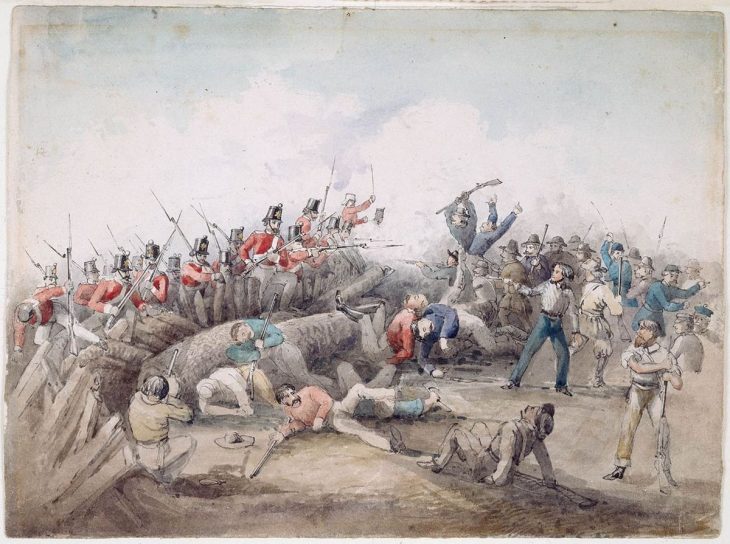
Word of the Day: Endogenous
Today’s word of the day comes from Anchor.fm: endogenous. According to Anchor,” Endogenous is an adjective that means originating from within. The Greek prefix E-N-D-O means ‘from within.’ And Genous (JEN ose) means ‘producing.’ Endogenous is frequently — but not exclusively — used in a scientific or medical context. The patient didn’t seem to pick up the illness from any outside sources. So we surmised that an endogenous virus was the cause.” The IPA pronunciation is / ɛnˈdɒdʒ ə nəs /. According to www.etymonline.com, it appears in English first in 1822.
On this date in 1854, gold miners in Ballarat, Victoria, Australia, fought a battle against British colonial troops in the Battle of the Eureka Stockade.
We Americans think of the California Gold Rush, which started in 1848 when James Marshall discovered gold at Sutter’s Mill, and lasted until 1855. That gold rush brought something like 300,000 people to California from all over the country and even the world, and set California on the path to being one of the richest states among these United States. San Francisco’s population went from about 200 in 1846 to well over 30,000 by 1852. A gold rush was a huge event back in the day.
In the USA, property rights were not clearly established, and a system of “claims” gradually arose. In Australia, when the gold rush began in 1851, with the publication of gold findings by Thomas Hiscock, Lieutenant-Governor Charles Joseph La Trobe, the first lieutenant-governor of the colony of Victoria, declared that all the gold belonged to the British crown, and miners would have to pay a license fee of 30 shillings per month, which would be over $150/month in 2017 dollars (I think). The miners were not very happy about this, so the government doubled the licensing fee. The proposed doubling was canceled when the miners started to gather arms. The miners were also upset that government agents would frequently go out and check for these licenses, and that the government had imposed strict liquor laws.
In October of 1854, a miner was murdered, and the man suspected of killing him, a hotel owner, was acquitted by a magistrate who, the miners thought, was corrupt. They rioted. They burned the hotel to the ground, and the owner and his wife fled. The government sent a small army contingent to suppress the riot, but it failed to do so. Later that month, upon the arrest of two miners in connection with the hotel fire, about 4000 miners gathered and decided to form a “Diggers’ Rights Society.”
The next month, something like 10,000 miners gathered together and formed the Ballarat Reform League. The leaders of the reform league tried to negotiate with the government to about the murder, the hotel burning, and all the rules and licenses that the British government had imposed, but Commissioner Robert Rede and Governor Charles Hotham not only refused to listen to the miners’ grievances but increased the number of police. According to some, Rede basically believed that, as the officer of the king, he had a right to impose rules on the commoners.
As Rede and Hotham arranged for military reinforcements, the miners decided to try armed resistance. On November 29, they met and burned the licenses they had to carry. Rede had the police conduct license searches the next day, and several miners were arrested. This just made the rest of the miners even angrier, resulting in the Reform League adopting a more military-type structure and preparing for war. The miners adopted a flag (the Southern Cross in white on a blue background), created an oath, and prepared to be assaulted. They constructed a stockade.
On December 3, the police along with military reinforcements from nearby garrisons, attacked the miners early in the morning. The results, according to accounts of the time, was a massacre. While six of the government forces were killed in the battle, the number of miners killed was somewhere between 30 and 60, including one woman. Many more were wounded, and even more would have been killed had it not been for the second in command, Captain Charles Paisley.
The result of the rebellion was initially martial law declared by Rede. But many Aussies agreed with the miners’ complaints, and eventually many of the reforms they wanted came to be, including the elimination of the licenses and electoral reform. About the Battle of the Eureka Stockage, the American writer Mark Twain said, “I think it may be called the finest thing in Australasian history. It was a revolution—small in size; but great politically; it was a strike for liberty, a struggle for principle, a stand against injustice and oppression. … It is another instance of a victory won by a lost battle.” That is very likely an exaggeration—most of the miners were mainly upset by the restriction placed upon their ability to earn an honest living.
But then again, the desire to live free, to resist the attempts of others to impose their will upon us, is endogenous to the human spirit.
The image is a representation of the Battle of Eureka Stockade in the Mitchell Library of New South Wales.